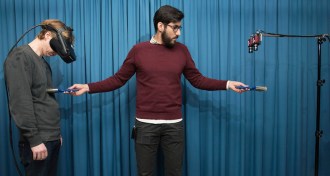Psychology
-
 Psychology
PsychologyDecision tree for soldiers could reduce civilian deaths
A new, three-part decision formula may help soldiers save civilians’ lives.
By Bruce Bower -
 Science & Society
Science & SocietyA few key signs betray betrayal
Like many relationships that collapse after betrayal, teasing out what goes wrong and who is at fault in betrayal isn’t so easy.
-
 Psychology
PsychologyMusic to just about everyone’s ears
Common elements of music worldwide point to its central role in group cohesion.
By Bruce Bower -
 Psychology
PsychologyThe guilty pleasure of funny cat videos
Many people love posting and looking at cute kitty content online. A new survey shows that this could be because it helps us manage our emotions.
-
 Animals
AnimalsWhen baboons travel, majority rules
GPS study suggests baboons use simple rules to resolve travel disputes without leaders.
By Bruce Bower -
 Anthropology
AnthropologyHuman laugh lines traced back to ape ancestors
Chimps make laughing faces that speak to evolution of human ha-ha’s.
By Bruce Bower -
 Psychology
PsychologyQuantity counts for baboons
Counting-like logic helps baboons track and compare accumulating sets of peanuts.
By Bruce Bower -
 Psychology
PsychologyOn Facebook, you control the slant of the news you choose
Facebook users shield themselves from opposing political ideas more than the site does.
By Bruce Bower -
 Psychology
PsychologyChildhood bullying leads to long-term mental health problems
U.S., British data raise bullying’s profile as a long-term mental health hazard for kids.
By Bruce Bower -
 Psychology
PsychologyTo reduce stress and anxiety, make yourself invisible
We may not be able to make people invisible, but researchers have discerned its effect on the human mind in a new study.
-
 Psychology
PsychologyBig ears don’t necessarily come with baggage
In a small study, adults judged children and teens with big ears as intelligent and likable.
-
 Climate
ClimateThe greatest natural disaster that almost was
The public’s response to the widest tornado ever recorded suggests earlier warnings need to be done right.